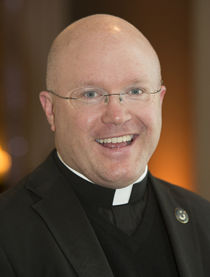
Faith
Often Christians don't look at Jesus the way he really was: the most joy-filled person who ever lived, someone who said he came into the world "so that my joy may be in you and your joy may be brought to perfection."

Landry
We come to the penultimate article in this 32-part series on the Plan of Life. Next week I'll give a synthesis of what we've looked at over the course of the past eight months, but today I want to focus on what should be both a fruit of living all parts of the Plan of Life as well as a specific component in its own right of any Christian game-plan toward holiness: Christian joy and cheerfulness.
Christian joy is, first, a gift and consequence of living a Plan of Life well. The Plan of Life is meant to facilitate a continual encounter with God through prayer, the Sacraments and charity, from the time of the Heroic Moment and Morning Offering at the beginning of the day to our General Examination at day's end. And when we maintain a vivid awareness of the presence of God accompanying us, loving us, and strengthening us, it's hard not to be joyful.
But at the same time, we have to work at being joyful. Joy is a fruit of various good habits, which are themselves the consequence of repeated good thoughts and deeds.
If we regularly ponder the reality that God madly loves us, abides within us when we're in the state of grace, providentially cares for us better than the greatest earthly father cares for his children, seeks to draw good even out of the evil we suffer or do, and always listens to us always in prayer, we will radiate a cheerfulness whether it's sunny or raining, whether we're experiencing worldly successes or struggles.
On the other hand, if we wallow in self-pity, give into complaining, nurse our envies, indulge our worries, or begin to live as if we can find lasting happiness in anyone or anything other than God, we will never be satisfied and, although we may experience ephemeral pleasures, we'll never really be happy.
That's why, in addition to Christian joy, which is fundamentally a gift of God beyond our direct control (Gal 5:22), it's good to talk about Christian cheerfulness, which is a general approach to life that consciously focuses on how life is fundamentally good and how our blessings always far outnumber our difficulties.
It's in this sense that St. Paul can command us, "Rejoice always! ... For this is the will of God for you in Christ Jesus" (1 Thess 5:16). Such a statement would be absurd if the apostle were commanding us to "feel" joyful, because we're never in complete control of our emotions. But he can command us to "rejoice always," because the types of behavior that lead to joy -- thanking God and others, counting our blessings, looking at the bright side, finding the good in others and in situations, surrounding ourselves with joyful and good people, beginning with immersing ourselves in God -- are largely within our control.
Pope Francis has been urgently and persistently calling all Catholics to live with this Christian cheerfulness.
In his exhortation The Joy of the Gospel, he described how many Catholics by their behavior basically make the good news seem like a lie because their conduct announces more a "bad news of great gloom" rather than the "good news of great joy." They live, Pope Francis says, as if they're perpetually returning from a funeral, as if life is a long Lent with no Easter.
On the other hand, when Christians' lives as a whole begin to glow with joy, the joy that comes from a profound recognition that Jesus has risen the dead triumphing over everything that could keep us down, those in the world who are seeking happiness down various roads that will never lead there will begin busting down our church doors trying to find the source of joy overflowing from Christian lives.
Pope Francis says that to grow in joy, we must regularly contemplate and enter into Jesus' joy.
Often Christians don't look at Jesus the way he really was: the most joy-filled person who ever lived, someone who said he came into the world "so that my joy may be in you and your joy may be brought to perfection" (Jn 15:11). We don't picture Jesus smiling. We don't focus deeply enough on how he says his kingdom is like the joy of the sower at harvest time, the joy of the man who finds a hidden treasure, the shepherd who finds his lost sheep, the mom who has just given birth, the dad who welcomes home his wayward son, or the invited guests at a wedding reception.
We don't ponder his natural joys at the goodness of creation, exulting in the birds of heaven and the lilies of the field. We don't share his jubilation at the loving hospitality of Martha, Mary and Lazarus, the conversion of Zacchaeus, the faith of the Canaanite woman and Centurion, the simple receptivity of little children.
We don't think enough about the secret of his joy -- his deep awareness of his being loved by the Father -- and follow him more deeply into the joy-filled mystery of divine filiation, that we are not orphans but much-loved adopted children of the King of Kings!
Christian cheerfulness, Pope Francis says, "drinks from the wellspring of [Jesus'] brimming heart." Like Jesus, a Christian ought to emit spiritual sunshine, not dark clouds. We should radiate a zest for life, not suck the life out of a room. Salvation history is meant to be a "great stream of joy," one in which we drink and bathe and invite others to join us.
"A Church without joy is unthinkable," Pope Francis said forthrightly in a 2013 homily. "Jesus has desired that his Bride, the Church, be joyful."
And if Jesus can't make his Bride happy, then how will others ever think that he can make them happy?
That's why it's so important, as a fruit of all the parts of a Plan of Life and a particular component in it, for us to receive and do all it takes to become cheerful, radiant followers, friends and emissaries of the joy-filled Savior who came to lead us to perfect happiness in this world and forever.
- Father Roger J. Landry is a priest of the Diocese of Fall River, Massachusetts, who works for the Holy See’s Permanent Observer Mission to the United Nations.
Recent articles in the Faith & Family section
-
Scripture Reflection for April 21, 2024, Fourth Sunday of EasterJem Sullivan
-
The new Temple: How Easter changes religionDr. R. Jared Staudt
-
The wonder of Ordinary TimeLucia A. Silecchia
-
Is there still responsibility for past sins after confession?Jenna Marie Cooper
-
Wounds, not scarsJaymie Stuart Wolfe


















